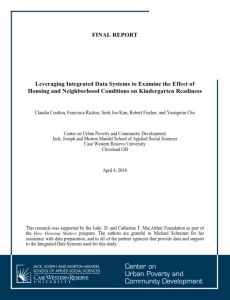Join getAbstract to access the summary!

Join getAbstract to access the summary!
The Center on Urban Poverty and Community Development
Leveraging Integrated Data Systems to Examine the Effect of Housing and Neighborhood Conditions on Kindergarten Readiness
Case Western Reserve University, 2016
What's inside?
To help young children better prepare for a life of education, address their poor housing conditions.
Recommendation
Poor housing conditions are taking a toll on many American children’s early development and school “readiness,” says the Center on Urban Poverty and Community Development. During a four-year study of kindergarten readiness scores in large cities, the center found that children living in disadvantaged neighborhoods or in subpar housing aren’t ready for kindergarten when they start. While the study’s findings may not be surprising to everyone, they do offer hard evidence that could help drive policy decisions to help families living in these conditions. getAbstract recommends this report to education professionals and public policy leaders.
Summary
About the Author
The Center on Urban Poverty and Community Development uses data and analysis to inform public policy and program planning.

















Comment on this summary